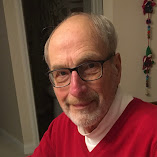This is a story I wish I could fill with details, but I am afraid for the safety of its central characters.
A woman who helps us with an important job in our house immigrated to the United States from Central America several years ago. She is friendly, energetic, and a good worker.
Recently she, with the help of her husband whom we’ve not met, did a very great kindness for us. What she did was far beyond her job description. It was justplain neighborly, and she neither asked for nor seemed to expect anything in return.
She is a U.S. citizen, and has a U.S. passport. She recently returned from a visit to her homeland.
She told us that not long ago she was stopped by the police in a neighboring suburb, apparently for no other reason than that she looked foreign. At least that’s the only reason she can think of. She had to show them proof of her citizenship.
This is terrifying. I know it’s not new for police to stop people whose skin color seems to them to be reason enough to stop them. But it is always wrong, and it seems likely only to get more common as the Republican administration ramps up its war on immigration and immigrants.
It it is also one step closer to even more wrong as the Republican party takes aim at more and more Americans whom it considers outside its norms.
If we can’t save a man our government admits it wrongly deported to a two-bit dictator’s prison, who else will we not be able to save? In the end, none of us.

